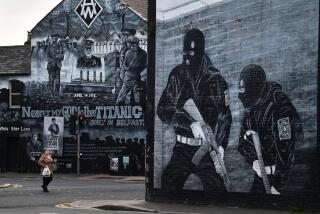British Forces Plotted to Kill Catholics, Probe Finds
- Share via
LONDON — British security forces plotted with Protestant paramilitary gangs to murder Catholics during the 1980s, an internal British police investigation concluded Thursday.
The report says British army intelligence officers and Northern Ireland police officers colluded with Protestant gunmen in targeting members of the Irish Republican Army for assassination, or intentionally failed to protect other Catholics -- some of them innocent civilians -- despite knowing their lives were in danger.
The result, said Metropolitan Police Commissioner Sir John Stevens, who led the investigation, is that members of the British security forces and their agents were able “to participate in terrorist crimes.” One of those crimes was the slaying of Pat Finucane, a 38-year-old Catholic lawyer who defended gunmen on both sides of the sectarian divide but who some police officers and Protestant paramilitary leaders contended was a member of the IRA. He was not.
Finucane was shot 14 times and killed while eating Sunday lunch at home with his wife and children in February 1989. His slaying remains one of the rawest events of the 30-year period known in Northern Ireland as the Troubles.
It was also the killing that triggered Stevens’ investigation, which began 14 years ago. On Thursday, Stevens said Finucane’s slaying could have been prevented had police acted on information provided them by their own informers within the Protestant gangs. He also said “the early arrest and detection of his killers” was possible had the will existed in the police force.
What has yet to be determined is whether the collusion between British agents and the Protestant paramilitaries was perpetrated by rogue elements -- officers acting on their own -- or whether it was an even more sinister enterprise endorsed by high-ranking officials who directed the security forces.
Northern Ireland’s Catholic community remains convinced there was a culture of collusion. “We believe the murder of Pat Finucane was state-sponsored and sanctioned,” said Mark Durkan, leader of the moderate, mostly Catholic Social Democratic and Labour Party.
One of the more disturbing elements of the investigation is the length of time it has taken from Finucane’s killing to the public disclosure by Stevens that British security forces abetted it. Stevens himself began the investigation as a relatively junior officer 14 years ago, and is now the chief constable of London’s Metropolitan Police.
In releasing a 20-page summary of his much more detailed -- and still secret -- report, Stevens said his inquiries had been “willfully obstructed and misled from day one” by the various security forces working in Northern Ireland. That included a deliberately set fire in his offices where sensitive files on the case were kept and where fire alarms had been disabled, just five months into his investigation.
Obstruction continued over the years in the form of rumors and counter-rumors “deliberately designed to throw us off course,” Stevens said.
He said his investigations had continued to uncover a wider pattern of collusion by the army’s Force Research Unit, which ran the network of informers.
One of those informers was Brian Nelson, an army double agent who was also intelligence chief of the Protestant paramilitary organization that claimed responsibility for Finucane’s killing. Nelson was arrested and sentenced to 10 years in prison in 1992.
His defense was based on the testimony of British Col. Gordon Kerr, who commanded the Force Research Unit. Kerr testified at the time that Nelson had provided police with advance knowledge of 730 threats against 217 people, and that his information had saved countless lives.
Stevens said he believed only two assassinations had been averted by Nelson’s duplicity -- one targeted at current Sinn Fein President Gerry Adams.
Kerr is now a brigadier and the military attache at the British Embassy in Beijing. Stevens said he was preparing papers to submit to the Director of Public Prosecutions related to Kerr’s conduct.
Nelson, who had been released from jail and given a new identity, died last week of natural causes.
More to Read
Sign up for Essential California
The most important California stories and recommendations in your inbox every morning.
You may occasionally receive promotional content from the Los Angeles Times.













